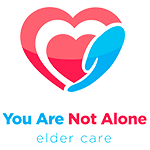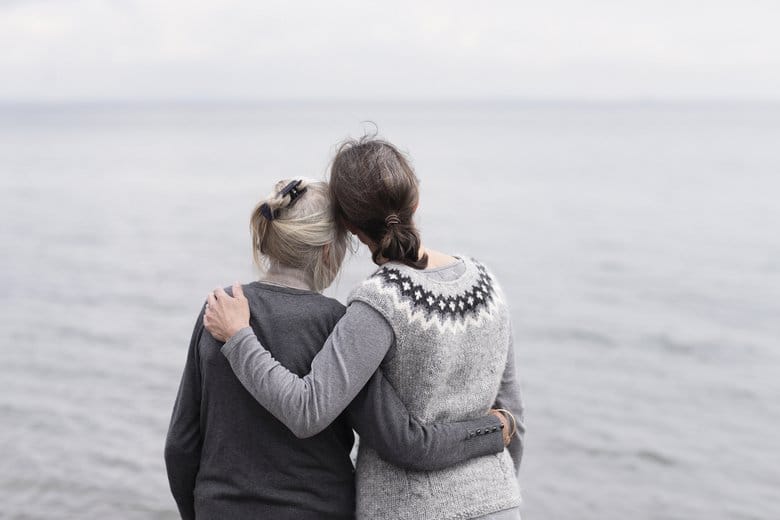From doctors and nurses to social workers to friends and extended family, family caregivers have a number of different people they can turn to. But here’s one resource you might not have heard of who can also offer valuable help: an end-of-life doula, also referred to as a death doula.
“End-of-life doulas provide practical, emotional and spiritual support for those facing terminal illnesses, and those who love and care for them,” says Christy Moe Marek, an end-of-life doula and founder of Tending Life at the Threshold in Minnesota who is also an instructor and the program development manager for the International End of Life Doula Association (INELDA), a non-profit organization providing trainings and certification.
Read on for more about what an end-of-life doula does and how they can be helpful for families.
The role of an end of life doula
End-of-life doulas offer a wide range of services. “For both the dying person and their loved ones, doulas act as a calm, neutral presence that can serve as a safe place to talk about all they are experiencing as they navigate the reality of terminal illness and mortality,” says Marek, explaining that the person dying is usually the client, and end-of-life doulas aim to identify and honor their needs while also supporting their family.
She says that end-of-life doulas can help normalize whatever arises and help everyone involved engage in ways that support meaning, purpose, joy and grief through tools like:
- Life review.
- Legacy projects.
- Having open conversations about what feels hard.
- Planning for the active dying time and after death time.
- Incorporating ritual.
- Reprocessing the death some weeks after it occurs.
Other services include everything from helping keep the patients’ medical team informed of any changes to safety issues to facilitating communication between family members to funerals, ceremonies and home wakes, among others, says Suzanne O’Brien, a registered nurse and founder of the International Doulagivers Institute, which provides education and training for end-of-life doulas.
“The list is extensive, and there is not one end-of-life that is exactly the same as another,” explains O’Brien, who also hosts the podcast “Ask a Death Doula” and recently ran the first Death Doula Global Summit. “Death doulas are here to assist the patient and family in their journey. The patient leads the way. We educate and provide many options, resources and suggestions for interventions for comfort all along the journey — the patient chooses what is right for them.”
Adrian Allotey, an end-of-life doula and owner of You Are Not Alone Elder Care in Colonia, New Jersey, sheds light on a variety of services doulas offer that can be helpful throughout the different stages of the process. They include:
Getting paperwork together
Allotey helps ensure her clients have their end-of-life paperwork together, including creating a living will and durable power of attorney for health care to guarantee their medical wishes and advocates are in place, as well as hold family meetings to make sure everyone knows the plan.
“I also find that people aren’t fully aware of the very medical terms and processes that they either agree to or deny in their advance directives,” she says, explaining that she usually asks clients to review their advance directives with her annually, since there can be major changes even over the course of just a year.
Overall, Allotey spends lots of time educating clients and discussing different medical scenarios with them. For example, a person might have filled out their paperwork at 60, only to look at it again when they’re 85 and find that their wishes have changed.
“I truly believe the more information people have, the less indecisiveness and guilt they will feel later,” she says.
Creating tangible momentos to leave behind
Another service? A life review, “which validates their life’s purpose through the examination and documentation of their entire life’s decisions, roles, contributions and impacts on their family, community and world,” she says. That includes creating “remembrances” — anything from stories to letters to cards — that the person can leave behind for their loved ones, she says.
Setting up a specific environment
She can create a “Living Well Plan,” for the person dying, which she explains “documents their physical, emotional, mental, and spiritual wishes for their last hours, days and weeks of life; such as what they want to happen, who they want to be there, and how they want the sacred environment to look, smell, feel, etc.”
Being there in the final hours
Allotey says most importantly, she helps educate on what to expect during the dying process, holding her clients hands through their last breath — called a Sitting Vigil, she says — and offering respite for the family so they can be fully present.
Common misconceptions about death doulas
There are also common misconceptions that can come with the role. Marek says one of the most common is that doulas are a replacement for hospice care, which is not true. “In fact, a family working with a doula has a much higher chance of getting signed on with hospice sooner, simply because they are having more open conversations about the dying process, and more focus is being put on what resources are needed,” she explains. She specifies that end-of-life doula services are not medical and therefore, are a complement to the person’s medical team.
“I think the more people on the team supporting a dying person and their loved ones, honoring their wishes and doing their best to meet their unique and varied needs, the better,” she says.
Another common misconception is that, because there is no government licensing for end-of-life doulas — compared, for instance, to the way a physician or social worker has licensing requirements — that doulas are not legitimate or highly educated, says O’Brien. “In fact, it can be quite the opposite. I have had hospice nurses and social workers take our Doulagivers training and said how much they learned from it,” she says.
How to choose a death doula
Speaking of factors like licensing, if you decide to hire a death doula, there are a few things to keep in mind as you begin the process.
Consider their education and training background. We’re used to seeing terms like board-certified when choosing a physician (so for instance, an internist might be board-certified in geriatric medicine or oncology by the American Board of Internal Medicine), but when it comes to looking for an end-of-life doula, it’s a little different.
Currently, there is no government licensing or regulatory body overseeing certification or training requirements, say O’Brien and Marek — but there “are independent organizations offering training and their own certification,” explains O’Brien. For instance, the National End of Life Doula Alliance (NEDA), an organization of which O’Brien is a founding member,offers “a national assessment and core competency badge in the U.S.,” she says.
And Marek explains that as an educational organization, INELDA, has, from the beginning, worked to set and uphold the highest standards for training, certification, ethics and code of conduct in the field.
Research their specific offerings. When choosing a death doula, it’s smart to research the doula’s specific offerings, says Marek. “As in many professions, end-of-life doulas specialize in many different areas. As people are called to this work from many different walks of life, many come to it with a whole host of skills and talents that they are able to incorporate to enhance or focus their doula work,” she says. “For instance, a lawyer called to this work might specialize in the advance care and estate planning aspects of end of life, whereas someone [who has] experience in the healing arts might incorporate energy work, mindfulness meditation or breathwork into theirs.”
Talk to people in your network. And in terms of where to find an end-of-life doula that fits with your family’s needs, Marek personally recommends word of mouth as a first step. INELDA and NEDA also provide directories on their websites.
What it costs to hire an end-of-life doula
It’s important to note that end-of-life doulas are not covered by insurance, including Medicare and Medicaid.
“We recommend to our trainees that they consider their rate based on what counselors and coaches in their area are asking, so on average this would be maybe starting at $75-$100 per hour,” says Marek. “Access is an issue when anything is private pay, so to alleviate that strain we also ask our trainees to consider working on a sliding scale where needed, and to take a number of cases per year for free, if possible.”
How end-of-life doulas can help family caregivers
“People need to know that there is non-medical assistance available at the end-of-life,” says Allotey. She says that can include any of the following types of support death doulas can offer loved ones:
- Family members may need an objective and trained set of eyes on the situation.
- They may need to rest and know that a doula is by their loved one’s side.
- They may need assistance creating a new normal after the person has passed.
- They may want a listening ear for their grief.
One of Marek’s past clients, Marie Tinnes of Minneapolis, explains that about two years after her mom was diagnosed with ovarian cancer, they were both exhausted and needed outside support. “We wanted someone to partner with us, to guide us in decision making, to support each of us independently,” she says. “We didn’t need medical advice. We had a team of doctors for that. But we needed someone to help us process that medical information.”
By the time they began working with Marek, Tinnes’ mother needed hospice care — and Marek provided a variety of services, from 24/7 phone consultations to discussing their fears, to, in the week leading up to her mom’s death, informing family and friends of the situation to setting up Reiki treatments and simply reminding Tinnes to eat and sleep. Once her mom passed, Marek helped Tinnes plan the memorial service, write the eulogy and even go through her mom’s belongings.
“She was able to support my mom and me at so many key moments during the entire four months that we worked together,” recalls Tinnes. “I feel that having Christy involved early in the process provided my mom and I with the ability to process many of our emotions in advance. Yes, I was sad, and I grieved when my mom died. But I felt prepared.”
Tinnes elaborates that as an only child, she did not have siblings to share the experience with. “Christy served not only as my mom’s end-of-life doula but as my surrogate sister,” she says.
And that experience can make all the difference. “Death doulas ‘hold the space’ and guide both patients and families through this often overwhelming and frightening time period,” explains O’Brien. “They reinforce teaching, suggest interventions for comfort and remind families that end-of-life is a natural part of the life experience and to not be afraid. This knowledge alone has been very comforting to families.”
Credits: https://www.care.com/c/stories/17099/death-doula-explained/

